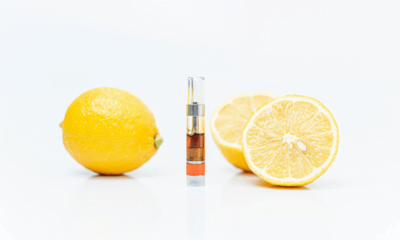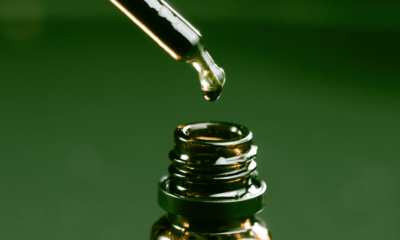A new white paper published this week explores the benefits using cannabinoids as part of your skincare routine.
The UK company behind the paper, Cellular Goods, refers to these benefits as the ‘5 A’s of Cannabinoid Skincare’ owing to cannabinoids’ strong ageing prevention, anti-inflammatory, antioxidant, anti-bacterial and anti-melanogenesis properties.
A growing body of scientific evidence is revealing that CBD and CBG are potent compounds that can prevent the skin ageing effects of UV radiation, inhibit the irritating effects of ‘inflammaging’ (inflammation that accelerates ageing), protect skin from the damaging effects of cellular oxidation, stop the growth of blemish-causing bacteria and through anti-melanogenesis, brighten skin and promote even skin tone.
To date, Vitamin C, retinoids and exfoliating acids are the active ingredients that have dominated the market as ingredients addressing skin ageing, blemishes and skin tone-related concerns. While they have proven to be effective, they are also known to cause skin irritation and sensitivity.

Alexia Blake, head of product development and product research at Cellular Goods, said: “Many conventional active ingredients prevalent in the market across anti-ageing, anti-blemish, antioxidant and hyperpigmentation products have unpleasant side-effects that prevent frequent use.
“The body of research explored in this white paper provides compelling evidence of the benefits of CBG and CBD as safe, effective and well-tolerated ingredients that present the skincare solutions of the future.
“Emerging research into cannabinoids is continuing to unveil the multifaceted benefits of these fascinating ingredients, which dovetails with their well-established tolerability amongst consumers with sensitive skin unlike many common skincare ingredients, including retinoids, Vitamin C and exfoliating acids. On this basis, cannabinoids present a new class of active ingredients that warrant a role in any skincare routine.”
Ageing prevention
Cannabinoids present a proactive solution to skin ageing thanks to their protective properties. Compared to the existing catalogue of anti-ageing ingredients such as Vitamin C, retinoids and exfoliating acids, cannabinoids have a higher tolerability allowing for more frequent use, meaning they can complement the use of other ingredients.
Cellular Goods confirmed these benefits in an in-vivo study involving the company’s Rejuvenating Face Serum, where 166 female participants reported that their skin was visibly rejuvenated, appeared healthier, more radiant and smoother after four weeks of use.
Anti-inflammatory properties
Findings from recent studies reveal CBG and CBD have a significant capacity to prevent inflammation caused by common stimuli, including UV radiation and bacterial pathogens in a way that is more effective than Vitamin C.
For instance, Willow Biosciences, Cellular Goods’ supply partner, reported that pre-treatment of human dermal fibroblasts with CBG or CBD was more effective than Vitamin C for preventing inflammation caused by UVA radiation.
CBD and CBG as an antioxidant
Emerging research has demonstrated that cannabinoids such as CBG and, to a lesser extent CBD, are equally if not more effective than Vitamin C at protecting skin from the ageing effects of reactive oxygen species (ROS) activity and UV exposure.
A recent study published by Willow Biosciences found that CBG and CBD had markedly higher antioxidant capacities than Vitamin C and were more effective at preventing the formation of ROS (a key driver of ageing) within human dermal fibroblasts.
Anti-bacterial potential
CBG and CBD’s potent anti-bacterial properties enable them to combat blemishes without irritating skin through two distinct pathways. First, the cannabinoids inhibit the inflammation caused by the pathogen Cutibacterium acnes (C. acnes). It also inhibits this pathogen’s growth, with CBG being more effective than CBD in both instances.
The overgrowth of C. acnes is one of the key mechanisms that consistently contribute to the formation of blemishes. The bacterium’s overgrowth contributes to acne vulgaris, a dermatological condition affecting 9 per cent of the global population.
Over-the-counter (OTC) treatment options targeting specific factors of acne vulgaris’ pathogenesis have emerged including active ingredients such as benzoyl peroxide, salicylic acid, sulphur and tea tree oil, however, the use of these ingredients is usually limited by their potential for irritation.
Anti-Melanogenesis
Excessive production of melanin in the skin can lead to hyperpigmentation, a term used to describe uneven darker patches of skin that can be caused by everything from acne scars to sun damage.
This common condition has fuelled the growth of a $6 billion skincare and treatment market. Through proprietary research, Cellular Goods discovered that CBG is particularly effective for enhancing the anti-melanogenesis outcomes of select skin brightening actives.
Additionally, cannabinoids benefit from enhanced effectiveness meaning that a lower concentration is sufficient without the irritation risks of higher-strength formulas. Cellular Goods filed a patent based on these results and is incorporating these insights into ongoing product development.
“The benefits of cannabinoids for maintaining healthy skin are both far-reaching and undeniable and the release of [this] white paper shows Cellular’s commitment to delivering science-backed cannabinoid-powered products that can support healthier, youthful skin and elevate any robust skincare routine.
“The total addressable market for skincare products designed to support age-prevention and tackle blemishes and hyperpigmentation is substantial and Cellular Goods is proud to provide consumers with rejuvenating products that can address this array of skincare concerns.”

 News6 months ago
News6 months ago
 Science5 months ago
Science5 months ago
 Industry6 months ago
Industry6 months ago
 News6 months ago
News6 months ago
 News5 months ago
News5 months ago
 Health5 months ago
Health5 months ago
 News5 months ago
News5 months ago
 Health3 months ago
Health3 months ago













